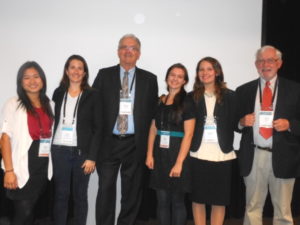

Young Scholar: Tara Mackenzie

Tara Mackenzie
University of Sunshine Coast
Sponsored by the Queensland Committee
Tara recently completed an environmental science degree and is now completing an honours degree. In her undergraduate, she undertook two Special Research Projects, both related to postharvest horticulture and improving farmer livelihoods in the South Pacific. This experience had a significant impact on the direction of her career. Her honour’s topic is “Quantifying harvest losses – a comparative study of domestic-orientated horticultural supply chains of the South Pacific and Australia”. Her literature review covers the wider subject of food security. Tara’s research aims to identify inefficiencies of horticultural supply chains, particularly those driven by policy and technology.
Conference Report
Another highlight would have to be Professor Catherine Bertini’s address at the networking dinner. She really kicked things off with her grass-roots stories and her inspiring stories of success and accomplishment with the UN World Food Programme. I think we all aspire to be someone of her calibre.”
The Crawford Fund Food Security Conference 2014 was my first conference and what a great start! Having recently commenced my honours degree (on the topic of food security and more specifically, horticultural waste) I am developing an understanding of how the issues are currently being addressed on the global stage. This conference presented the issue from many perspectives, with reasonable solutions to feeding the world’s people. I particularly enjoyed the agricultural focus of the topic and of course the international development work that gives the science a greater purpose.
In writing up my literature review I have discovered that even the basic understanding of what food security really is can be quite debatable. The broad content of the conference will make contribution to each section of my literature review in covering the body of knowledge surrounding food security. The conference presented a number of inter-related, yet unique speakers with an interest in mitigating world hunger. Speakers used overwhelming statistics and clever presentation slides to tell their stories on how we can manage this global problem. Viewing food security from different perspectives, from economics to nutrition will enable me to frame up a concise literature review to cover all angles of the issue.
Something that was highlighted in the conference was the issue of starving people versus overfed people and the overwhelming reality that approximately 30% of the world’s people are overweight and 60% of those are living in developing countries. This scares me … as it should! The problem is very complex and the conference renewed my faith that something can and is being done to address it. A number of speakers mentioned the nutritional value of the food, rather than just the mass of food required. Those presentations were particularly interesting to me because in bringing people out of poverty we want to transition them to a quality of life. On top of this considering, the number of people involved in agriculture, it’s about improving livelihoods and improving quality of life.
My favourite presentation was that by Dr Helen Szoke. On the topic of waste, she was a little out-numbered on the pro-production stage. Oxfam in my mind are a fabulous organization doing great things around the world. The simpler and more attainable solution of wasting less is ideal to me. I strongly advocate the role of postharvest particularly when we consider what Helen said, ‘1 in 8 people are hungry, 80% of which are involved in agriculture in some way’. Using a case study approach my honours thesis is seeking to quantify the real waste in current supply chains of developed versus less developed countries. In my research I have found a lack of literature focusing on the up-stream losses of supply chains (food rejected from the supply chain) and a pile of research at the consumer end. Helen brought this issue to the table talking about threats to agriculture due to land restraints, rising input costs, and changing climate.
Another highlight would have to be Professor Catherine Bertini’s address at the networking dinner. She really kicked things off with her grass-roots stories and her inspiring stories of success and accomplishment with the UN World Food Programme. I think we all aspire to be someone of her calibre.
Thank you to everyone at the Crawford Fund for the experience.